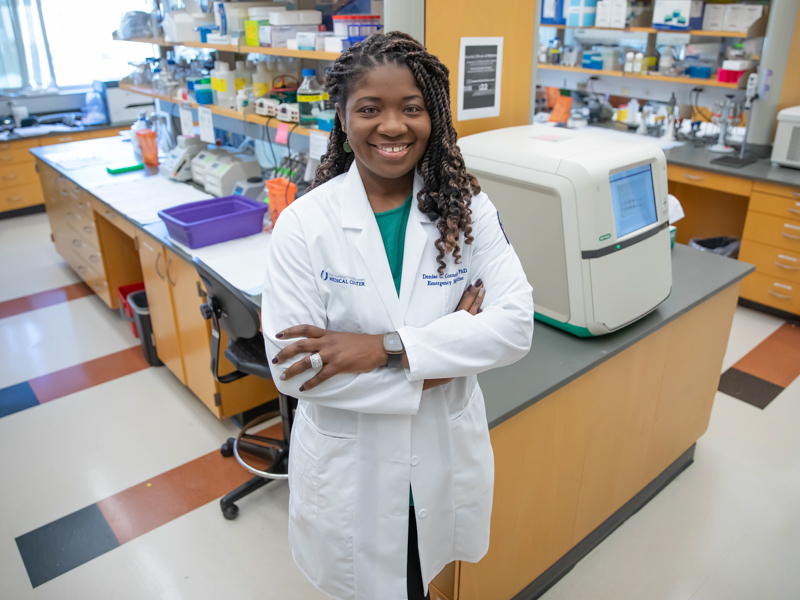Front and Center: Denise Cornelius

Editor's Note: In honor of Black History Month’s 2022 theme, Black Health and Wellness, we want to celebrate the contributions, breakthroughs and cultural richness of Black professionals and students at UMMC. See more Front and Center features.
Dr. Denise Cornelius is one of the University of Mississippi Medical Center’s leading young scientists and alumni.
An associate professor of emergency medicine, Cornelius has an R01 grant from the National Institutes of Health to study immune dysfunction in preeclampsia. In this condition, pregnant women develop high blood pressure with other organ dysfunction, and can result in stroke or seizures in mom, as well as growth restriction and low birth weight for baby.
Using multiple experimental models, her lab investigates changes that happen in kidneys and blood vessels during preeclampsia and how they are influenced by the immune system. In particular, she’s looking at t-helper cells, natural killer cells and inflammasomes, a group of proteins that trigger the inflammation as part of an immune response.
As director of pre-clinical research for the Department of Emergency Medicine, she also works on projects related to sepsis, a potentially lethal blood infection. She and her UMMC collaborators have applied for funding that would support a new project to study how some of the same inflammatory factors Cornelius examines in her preeclampsia work contribute to sepsis.
Cornelius says one of the keys to being successful in research is to find an area that excites you and encourages you to explore the unknowns and “mysteries in science,” she said.
“I’ve been able to do so many kinds of research in my career,” Cornelius said, including some of her first lab work in UMMC. Then a student at Howard University in Washington, D.C., the Jackson native did summer research on eye infections in the Department of Microbiology and Immunology. The experience helped shift her career goal from medicine to biomedical science.
Cornelius earned a PhD in microbiology and immunology from UMMC in 2012, developing new methods to genotype Trichomonas parasites in order to identify the different strains that were more infectious or more likely to cause pelvic inflammatory disease. As a postdoctoral fellow in the Department of Pharmacology and Toxicology, she moved to preeclampsia. Cornelius joined the UMMC faculty in 2015.
All of her past and present research is tied to diseases with health disparities that disproportionately affect women, Black Americans, or Mississippians. Cornelius realized her passion for this work early in her training, and it is part of the reason she’s a scientist.
“We’re not doing research for the sake of doing science,” Cornelius said. “We are doing it to improve life and health for the next generation.”
That includes training new researchers who are just as excited about science as Cornelius. Her first PhD student is now a postdoctoral fellow at St. Jude Children’s Research Hospital; her current lab has one PhD student and one postdoctoral fellow. She mentors UMMC’s high school and college programs as well as the American Heart Association’s HBCU Scholars program.
Off-campus, Cornelius, her husband and their two sons live in Madison, where they lead a church and volunteer at their children’s school and community organizations.
“My experience with science is that it’s a community,” Cornelius said. “Working with people from multiple varied backgrounds helps improve science. It takes a united front to be victorious. It is a team effort.”


